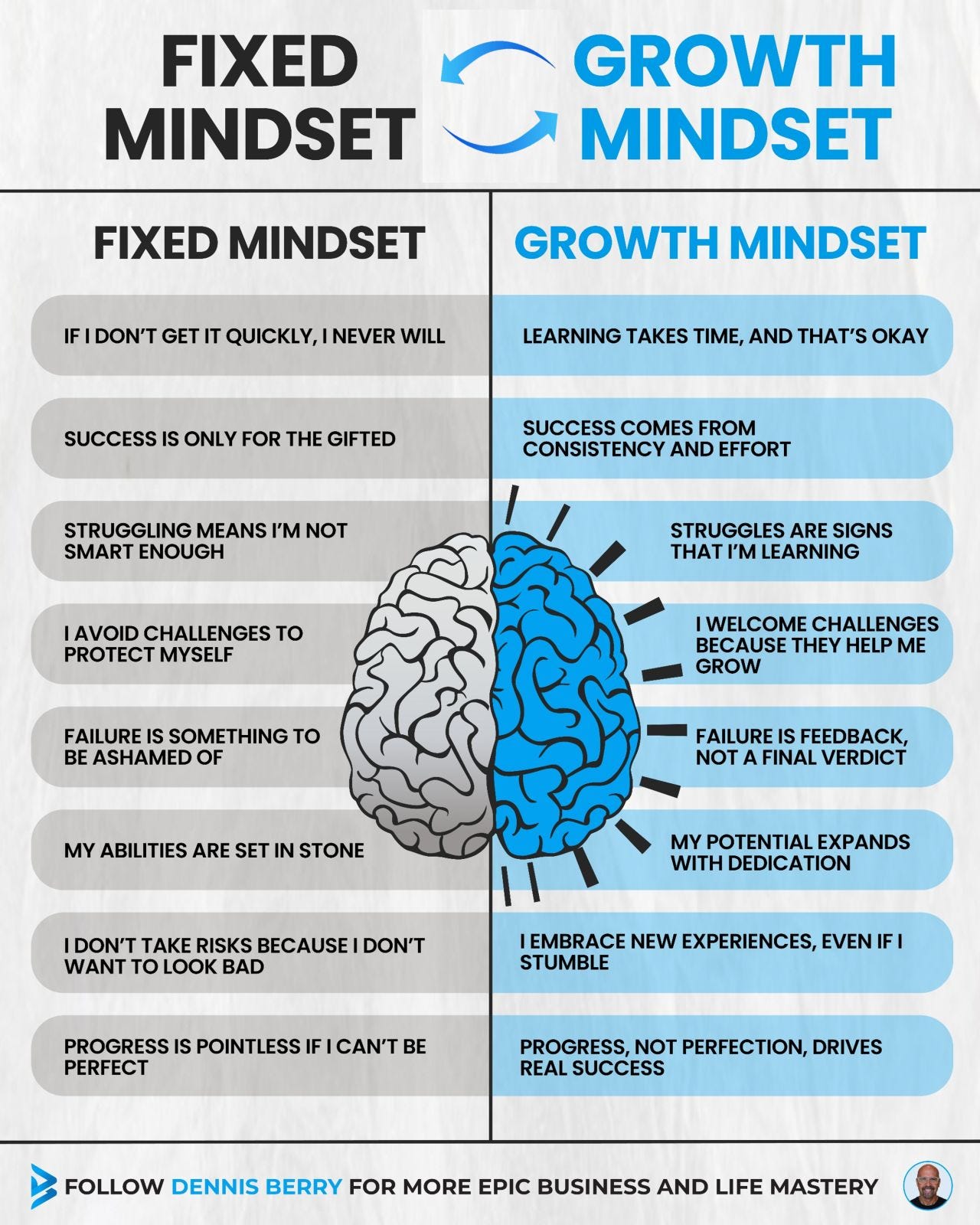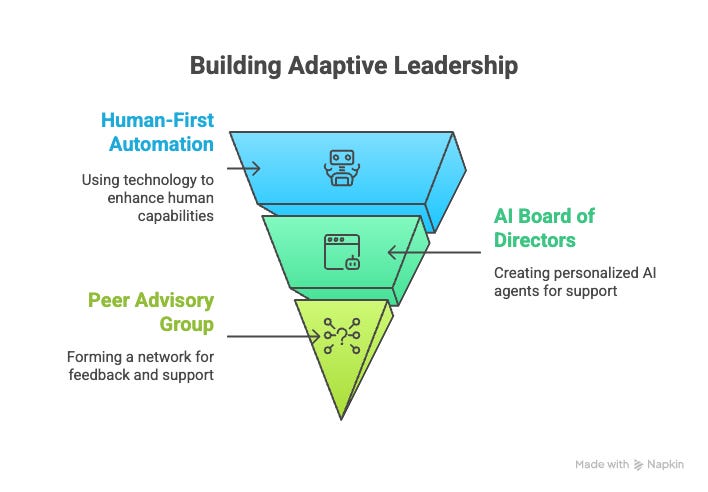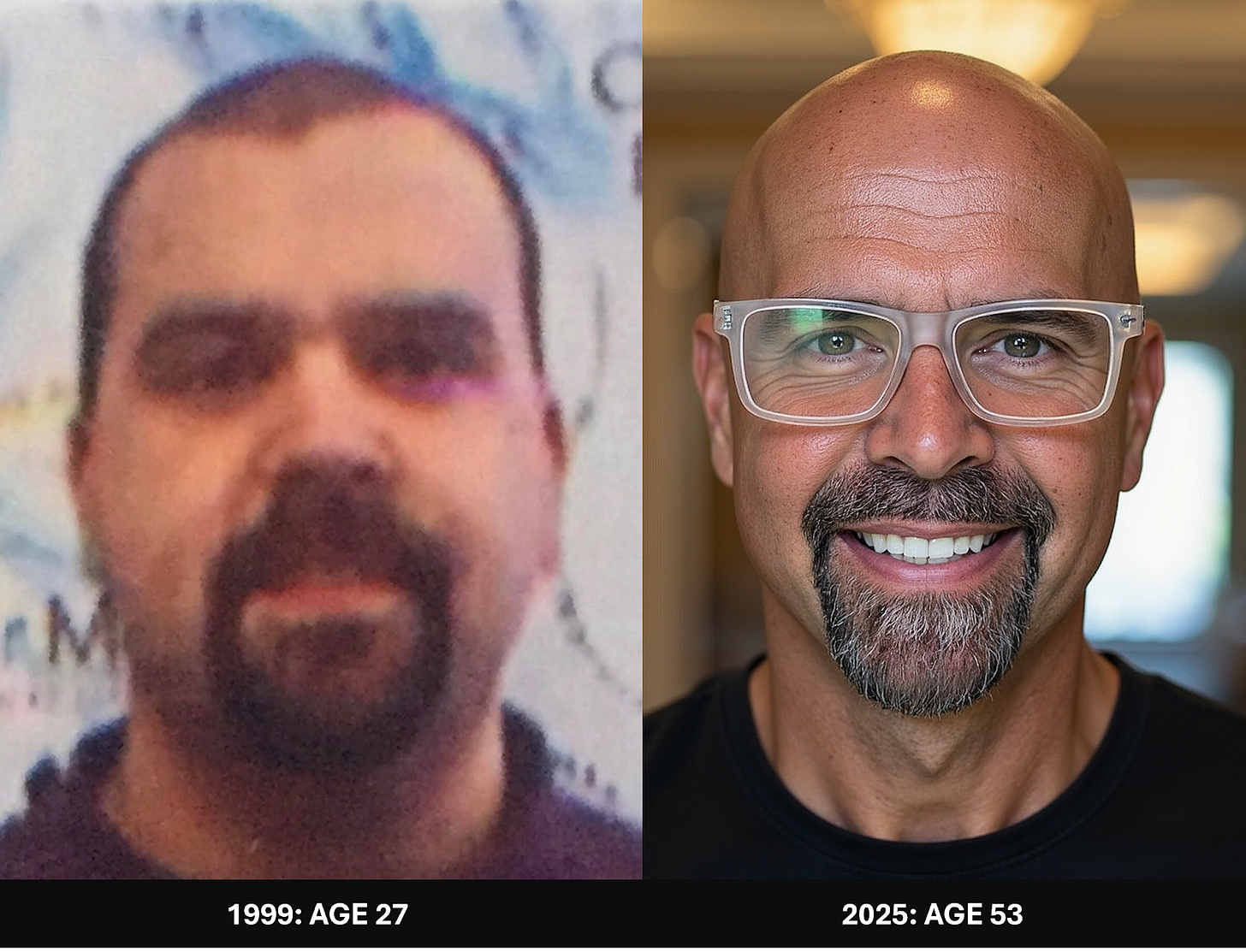How Elite Leaders Adapt in AI Chaos
Part 2 of the AI Leadership Triad: Adapt without losing your identity
Thanks for reading! To access our community, full prompt library, coaching, and AI tools saving leaders 5-10 hours per week, check out our Premium Hub.
The second pillar of the AI Leadership Triad is adaptation. But not reactive adaptation. Strategic adaptation.
Last week, Anjeanette Carter showed you how creativity sees what AI misses. This week is about what you do with those creative insights. Because creativity without adaptation creates constant pivots. You chase every new idea and build nothing sustainable. Adaptation is what transforms creative thinking into lasting change.
But here’s the tension: how do you adapt constantly without losing your identity?
How do you evolve your methods while maintaining your mission? That’s the skill most leaders struggle with.
I asked Dennis Berry to break this down because he’s spent 20 years helping elite performers navigate change without losing themselves. He leads 195,000 readers through The Elite Leaders Network. He knows the difference between reactive scrambling and strategic adaptation.
Here’s his framework.
The Unseen Skill That Future-Proofs Your Leadership in the Age of AI
Hi, I’m Dennis Berry.
For the last twenty years, I’ve worked with leaders, founders, and executives who had achieved the kind of success most people only dream about. They had the money, the title, and the accomplishments.
But when we really talked, they confessed they were trapped. Trapped by burnout, unfulfilling work, or personal struggles, like health issues, addiction, or a crumbling marriage, that they felt they couldn’t share. My work, through the Elite Leaders Network, focuses on helping these high-performers navigate those challenges and build a life of true wealth, one that goes beyond the bottom line and just business… it includes health, relationships, and deep purpose.
My friend Joel here is running a great series on the top skills for leaders in the decade ahead. He nailed the three: Adaptability, Creativity, and Innovation. But today, I want to zero in on the one that serves as the foundation for the other two: Adaptability.
The greatest skill a leader can have is having a growth mindset.
I’ve always said that the best leaders and most successful companies aren’t necessarily the smartest or the most innovative; they just adapt to change the quickest.
When we hear “adaptability,” we often think of just reacting to change. But as AI continues its rapid march into every industry, true adaptability for elite leaders isn’t about simply adjusting your budget or tweaking a job description. It’s about anticipating, evolving, and ultimately, leading the change yourself.
The word Entrepreneurship gets thrown around a lot on social media. It’s a sexy word. But true entrepreneurs are real visionaries. They have a clear vision and find a way to bring it to life.
Very few people over the years can do that at a high level… Steve Jobs, Richard Branson, Elon Musk, Jeff Bezos. Love‘em or hate ‘em… they had a vision and brought it to life.
MOST of what they did wasn’t even possible for the average person… until now.
Today, AI makes bringing those ideas to life infinitely easier and faster.
AI isn’t a competitor... it’s a co-pilot. But just like any co-pilot, it requires a clear, confident leader at the controls. The leader who fails to adapt won’t be replaced by a robot… they’ll be outmaneuvered by a competitor who learns how to use AI efficiently.
Why Adaptability is Your Most Valuable Asset
Elite leaders are often creatures of habit and systems, and for good reason. They found a formula for success, and they stick to it. But what happens when the very ground that formula is built on begins to shift?
The old models of leadership were about mastery. You mastered a skill, a market, or a system, and you built an empire on that mastery. The new model of leadership is about fluidity. It’s about being able to learn, unlearn, and relearn faster than your competition.
The Problem of the Past: The leader who built a thriving business on an old-school model now struggles against an algorithm they don’t understand. Their hard-won experience becomes a liability if they can’t adapt to the new digital landscape.
The Opportunity of the Future: The adaptable leader sees AI not as a threat, but as an opportunity to offload rote tasks and focus on the uniquely human skills that AI can’t replicate, like emotional intelligence, complex problem-solving, and vision.
This isn’t just theory... I’ve seen it firsthand.
One of my clients, a manufacturing CEO who built a seven-figure business 25 years ago, was hitting a wall. He was on the verge of burnout because he was trying to run his successful, but old-school, business while battling the rapid pace of digital change.
Through our work together, he didn’t just learn a new tactic... he mastered a mindset of continuous evolution. He started delegating and automating certain tasks to new systems, freeing himself up to focus on what he was truly good at: building relationships and innovating.
Now… his business is more efficient and profitable than ever, and he’s working 30% fewer hours. That’s the power of adaptable leadership.
A Framework for Building Adaptive Leadership
So, how do you build this kind of adaptable leadership in your own life? It’s not about being the first to adopt every new gadget... It’s about developing core principles that ensure your mind and your business can handle the pace of change.
Here is a three-part framework I use with my most successful clients to help them thrive in uncertain times:
1. Focus on “Human-First” Automation
The purpose of technology is to serve human beings, not the other way around. Adaptability isn’t just about using new tools... it’s about using them to enhance your humanity, not replace it. Your most valuable asset is your time and focus... AI should protect that.
Practical Application: Audit your weekly tasks. Identify one or two repetitive, low-value tasks you can automate using an AI tool. Use AI to draft a basic first version of a report, summarize a long email chain, or brainstorm a list of content ideas. By delegating the grunt work, you free up your mental energy for the high-level, strategic work that only you can do.
2. Set Up Your Personal AI Agent “Board of Directors”
The most forward-thinking leaders are using personalized AI agents to create powerful accountability and efficiency in their lives. These aren’t just one-off ChatGPT prompts... these are custom agents programmed with everything about you, your strengths, your weaknesses, your business model, and your goals.
Practical Application: Create a few custom AI agents to act as personal consultants.
I personally have my own Business Strategist Agent who knows my entire business model and offerings, my personal strengths, and my interests.
I have a Psychologist/Coach Agent I consult with daily to stay accountable and focused on the right tasks.
I even have a Marriage Counselor Agent and a Financial Coach Agent to help manage those huge life pillars.
This digital “Board of Directors” keeps you organized, focused, and adaptable to change by continuously optimizing your personal and professional life.
3. Seek a Peer-to-Peer Advisory Group
The single greatest mistake a leader can make is to try and adapt alone. The pressure you feel as an elite leader to be “perfect” and have all the answers is often the very thing that leads to burnout and isolation. You need a trusted group of peers who are also navigating the same challenges.
Practical Application: Find a confidential advisory group or network of peers who are committed to personal and professional growth. This group can be your sounding board for new ideas, your support system during difficult times, and your accountability partners for staying ahead of the curve.
This is the core principle behind The Elite Leaders Mastermind, a peer-to-peer, solutions-focused group I founded. It’s a place where you can find honest feedback and support from other high performers who truly understand the unique pressures you face, whether in your personal life or your next big business move.
You can learn more about that here.
In the face of an AI-driven future, your ability to adapt will be the ultimate differentiator. It’s the single skill that will allow you to not only survive the next decade but to lead it.
By focusing on human-first automation, leveraging your own fleet of AI agents, and surrounding yourself with a confidential peer group, you ensure that you are always in the driver’s seat of your own evolution.
Side note: I’ve been sober for 22 years. It’s an important part of my story because I’m living proof that anything is possible at any age if you truly want to do something.
I became the leader that I always wish I had. Now that I’m 53 years old, I live in Playa Del Carmen on the Caribbean Sea, I’ve traveled around the world and I’ve lived more in my short 53 years than most 100-year-olds… and I’m just getting started.
I’m often asked in interviews what advice I would give to my younger self, and it’s always the same: ASK FOR HELP.
Asking for help is a sign of strength, not a sign of weakness.
If you ask for help, you’ll get “there” faster.
There are 6 billion active social media users around the world. I’m sure there are at least a few million who would be willing to help.
If you truly can’t find anybody, ask me… I’ll help.
If you’re interested in learning more about how to navigate these challenges and build a truly successful and balanced life, I invite you to learn more about my work on my website, DennisBerry.com, or to connect with me on LinkedIn or Substack where I share daily insights for leaders.
Thank you, Dennis!
Adaptation transforms creativity into momentum. But it’s still not enough. The third pillar of the AI Leadership Triad is innovation. Not innovation theater. Real innovation that improves how you serve your mission.
Next week, John Brewton breaks down how operating strategists think about innovation differently than everyone else, and how they build it as a systematic capability instead of chasing shiny tools.
Until then, ask Dennis’s question: which pillar of your leadership needs the most work? Creativity, adaptation, or systematic innovation?
PS: Many subscribers get their Premium membership reimbursed through their company’s professional development $. Use this template to request yours.
Let’s Connect
I love connecting with people. Please use the following connect, collaborate, if you have an idea, or just want to engage further:
LinkedIn / Community Chat / Email / Medium










Thank you so much for including me in this important series, Joel.
The ability to adapt to change is VITAL for success... now more than ever.
And, as I said in the article... if you don't know how to do something or get somewhere... ASK FOR HELP.
You'll get there faster!
“The old models of leadership were about mastery. You mastered a skill, a market, or a system, and you built an empire on that mastery. The new model of leadership is about fluidity. It’s about being able to learn, unlearn, and relearn faster than your competition”
Couldn’t agree more. Thanks for this post it was a good read.